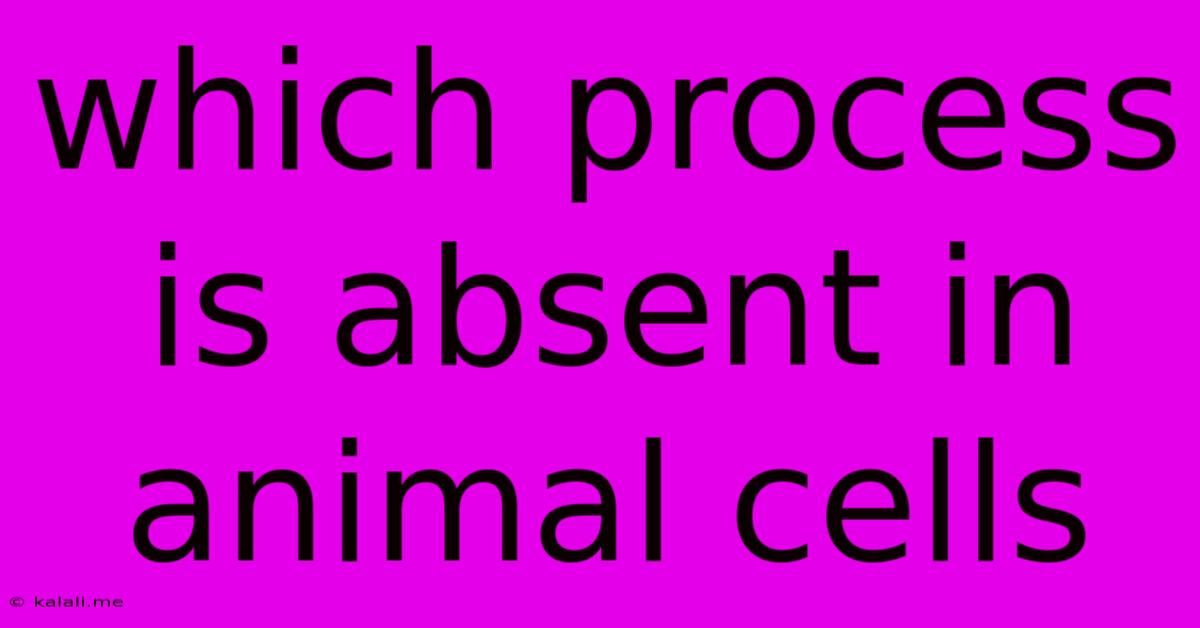Which Process Is Absent In Animal Cells
Kalali
Jun 15, 2025 · 3 min read

Table of Contents
Which Process is Absent in Animal Cells? A Deep Dive into Photosynthesis
Animal cells lack the ability to perform photosynthesis, a crucial process that allows plants and other autotrophic organisms to convert light energy into chemical energy in the form of glucose. This fundamental difference shapes the entire metabolic landscape of animals, setting them apart from plants and algae. This article will explore why photosynthesis is absent in animal cells, the reasons behind this absence, and its implications for animal biology.
Photosynthesis is a complex process requiring specialized cellular machinery not found in animals. Let's delve into the key components missing in animal cells that prevent them from performing photosynthesis:
1. Absence of Chloroplasts: The Photosynthetic Powerhouse
The most significant reason why animal cells cannot photosynthesize is the absence of chloroplasts. These organelles are the site of photosynthesis in plant cells. Chloroplasts contain chlorophyll, a green pigment that absorbs light energy, and other crucial components like thylakoid membranes, where the light-dependent reactions of photosynthesis occur. Animal cells lack these complex, membrane-bound organelles, rendering them incapable of capturing and utilizing light energy.
2. Lack of Chlorophyll and Other Essential Pigments
Chlorophyll is not the only pigment involved in photosynthesis. Other accessory pigments, such as carotenoids and phycobilins, also play vital roles in light absorption and energy transfer. Animal cells simply do not produce these pigments. Without these essential molecules, light energy cannot be effectively captured for conversion into chemical energy.
3. Missing Enzymes and Proteins for Photosynthetic Reactions
Photosynthesis involves a series of intricate biochemical reactions catalyzed by specific enzymes and proteins. These enzymes are responsible for carbon fixation, the Calvin cycle, and other essential steps in converting light energy into glucose. Animal cells lack the genetic information and the necessary cellular mechanisms to produce and assemble these crucial enzymes. This absence directly prevents the execution of the photosynthetic pathway.
Why Don't Animals Photosynthesize? Evolutionary Considerations
The absence of photosynthesis in animals is a result of evolutionary adaptation. Animals evolved to obtain energy through consuming other organisms – a heterotrophic lifestyle. This strategy proved highly successful, allowing animals to thrive in diverse environments. The energy expenditure and resource requirements for developing and maintaining the complex photosynthetic machinery would likely have been counterproductive for animals' evolutionary trajectory. The evolutionary pressures favored the development of efficient mechanisms for acquiring and processing energy from other sources rather than investing in the intricate processes of photosynthesis.
Implications of the Absence of Photosynthesis in Animals
The inability to photosynthesize has profound implications for animal biology:
- Dependence on other organisms: Animals are entirely dependent on consuming other organisms (plants, animals, or fungi) for their energy needs. This creates complex food webs and ecological interactions.
- Metabolic differences: Animal metabolism is fundamentally different from that of photosynthetic organisms, relying on oxidative phosphorylation for ATP production instead of photosynthesis.
- Mobility and behaviour: The ability to move freely and actively search for food is a significant feature of animal life, shaped by their heterotrophic nature.
In conclusion, the absence of photosynthesis in animal cells is a defining characteristic stemming from the lack of chloroplasts, chlorophyll, and other necessary enzymes and proteins. This fundamental difference in metabolic strategy reflects a successful evolutionary adaptation that has shaped the diverse and dynamic world of animals.
Latest Posts
Latest Posts
-
What Is The Particle Size Of Solution
Jun 15, 2025
-
Why Is The Earth Called A Unique Planet Short Answer
Jun 15, 2025
-
Eukaryotic Cells Are Much More Complex Than Prokaryotic Cells Because
Jun 15, 2025
-
Amplitude Of Sound Is Measured In
Jun 15, 2025
-
Excel Is Showing Formula Not Result
Jun 15, 2025
Related Post
Thank you for visiting our website which covers about Which Process Is Absent In Animal Cells . We hope the information provided has been useful to you. Feel free to contact us if you have any questions or need further assistance. See you next time and don't miss to bookmark.